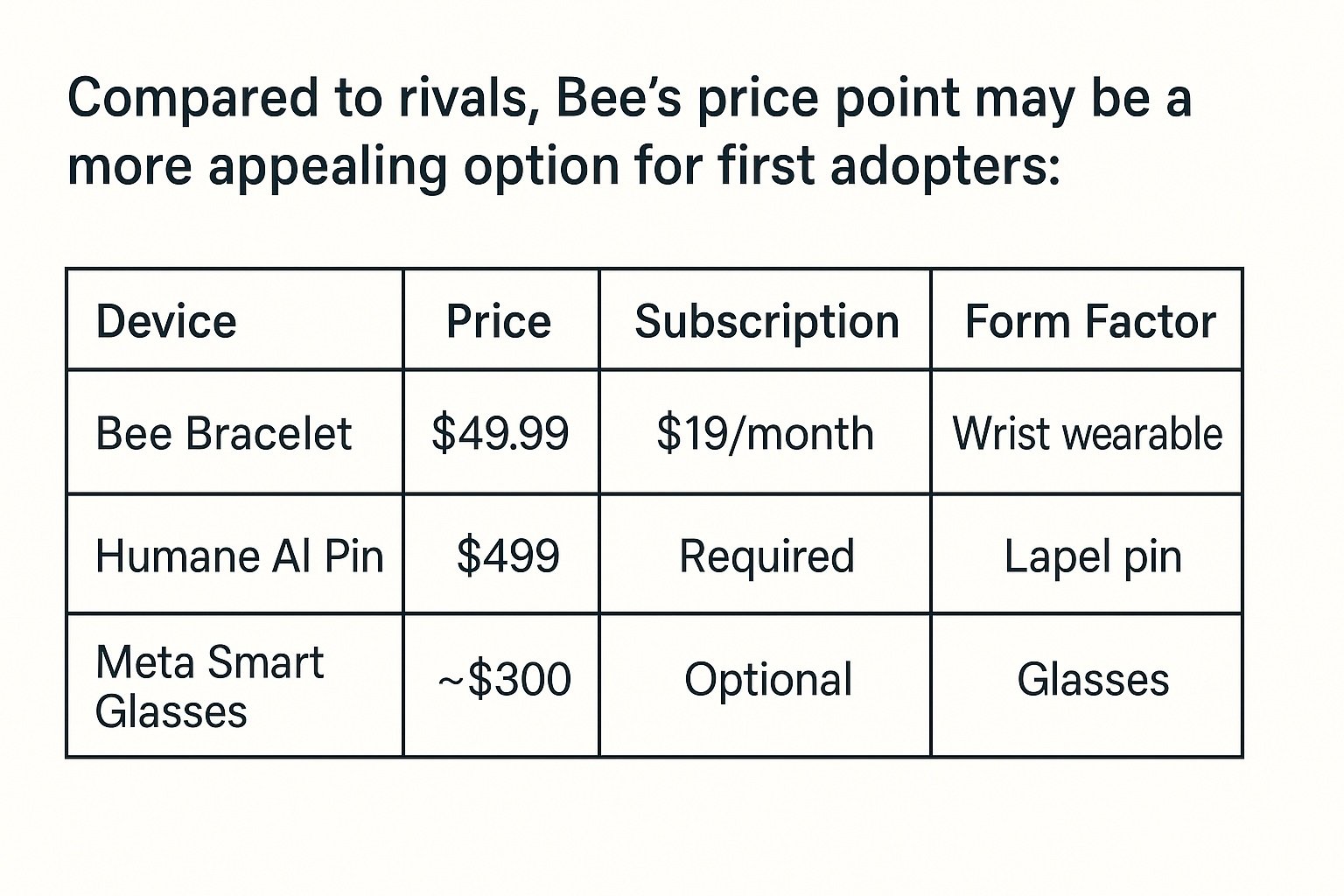Amazon has acquired Bee, a startup known for its AI-powered, voice-driven reminder tasks wearable. The deal was revealed by Bee co-founder Maria de Lourdes Zollo in a LinkedIn post. Amazon confirmed the acquisition to TechCrunch, but the deal hasn’t officially closed.
Key Takeaways
- Amazon acquires Bee, maker of a $49.99 AI bracelet and Apple Watch app.
- Bee’s wearable listens to conversations to create smart reminders and to-do lists.
- Acquisition not yet finalized, but Bee employees were offered jobs at Amazon.
- This move signals Amazon’s deeper interest in AI wearables beyond Echo devices.
- Privacy concerns remain, especially around always-on recording.
What Is Bee and What Does It Do?
Bee creates cost-friendly AI wearables that help with daily tasks. The startup offers:
- A $49.99 wearable bracelet, plus a $19/month subscription.
- An Apple Watch app with comparable voice-recording capabilities.
These devices can listen to conversations (unless muted) and AI can:
- Generate reminders.
- Create to-do lists.
- Suggest follow up and relevant actions.
Bee wants to create a “cloud phone” – an assistant that can do everything your phone can do by using simple voice commands.
Amazon’s Step into AI Wearable Technology

Bee’s acquisition by Amazon marks a strategic move into the AI wearable technology space, moving away from the Alexa and Echo focused smart home ecosystem.
Peer competitors from other tech companies include:
- Meta adding AI to their smart glasses.
- OpenAI is rumored to be working on its own AI technology.
- Apple is said to be developing AI smart glasses.
- Rabbit and Humane AI have launched AI wearables, but didn’t attain significant market share.

Bee’s Vision: AI as a Trusted Companion
Bee wants its users to see the device as more than a mere gadget to wear – the AI is there to assist their daily functions.
As the Chief Technology Officer, they see,
“A personal, ambient intelligence that feels less like a tool and more like a trusted companion.”
AI as a companion means not simply responding, but helps users reflect and make memories, and learns voice patterns and adapts to the user’s environment to make their life easier throughout the day.
Privacy Considerations Stay Top of Mind
With wearables that feature always-on functions, privacy issues are of utmost concern, and Bee is doing its best to mitigate risks:
- Bee does not save recordings, so no audio is used for AI training purposes.
- Users are always able to delete data.
- The AI retains learned insights but not the recordings.
- Bee states that they only capture audio of individuals that have provided explicit consent.
Users will also be able to:
- Authorize data collection restrictions based on subjects or geography.
- Pause the learning feature in sensitive contexts.
- Shift to on-device AI learning, which mitigates risks to privacy.
Still, the most pressing concern is the shift to Bee. Privacy and policy concerns have recently come to the forefront due to Amazon’s acquisition and troubling history.
Amazon once shared unconsented Ring camera footage with law enforcement.
They also settled FTC allegations this year over Ring employees inappropriately accessing customer videos.
Bee and Amazon: What’s Next?

Despite the fact the acquisition deal is not finalized, Amazon is preparing to integrate Bee’s team. While the prospective uses for Bee’s ongoing projects remain speculative, the acquisition strongly signals:
- Wearable devices with Alexa functionality.
- Growth into on-the-go personal AI assistants.
Increase competition from Meta, OpenAI, Humane in the smart glasses and pins market.
Summary: Why This Matters
Amazon’s acquisition of Bee goes beyond mere business strategy; they are signalling the advancement of AI-powered wearables. Amazon certainly does not want to be trailing behind.
- With Bee’s AI-powered wearables, Amazon gains:
- Previously unattainable to consumers because of price, now there is a lower competition amongst wearables.
- This allows for more advanced, mobile Alexa functions.
- As tech for recording voices becomes more common, there are significant privacy concerns.
This aligns with the growing trend of AI personal companions able to assist users in real-time.
Final Thoughts
As with anything, there is room for innovation. Bee’s concept of a smart assistant who can listen, learn, and help— all from the user’s wrist is now a piece in Amazon’s puzzle.
It is yet to be decided if this acquisition will spark the creation of a new tier of AI wearables or enhance existing Echo devices. What is certain is that the speakers won’t be the only things users will be taking with them.
